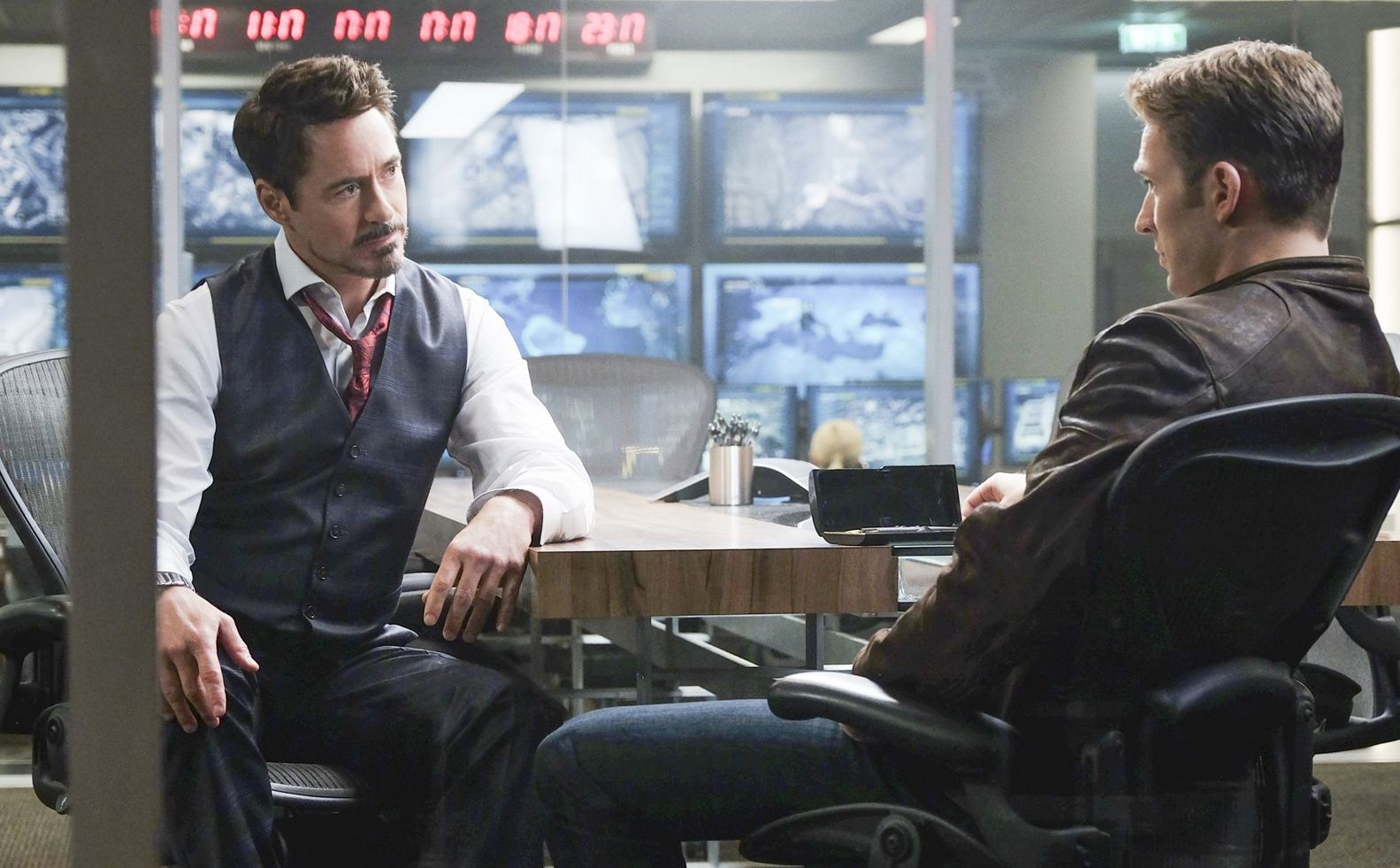
Many people writing about the new Captain America: Civil War have commented on what seems to them a fundamental irony driving the story: that Tony Stark, the self-described “genius billionaire playboy philanthropist” who always does his own thing, agrees to the Sokovia Accords that place the Avengers under international political control, while Steve Rogers, Captain America, the devoted servant of his country, refuses to sign them and basically goes rogue. But I don’t think there’s any real irony here, for two reasons.
The first and simplest reason is that the destruction of Sokovia, which we saw in Avengers: Age of Ultron, was Tony Stark’s fault. Ultron was his creation and no one else’s, and in this new story he is forced to remember that the blood of the people who died there is on his hands. There’s a funny moment in the movie when Ant-Man is rummaging around in Tony’s Iron Man suit to do some mischief to it, and when Tony asks who’s there, replies, “It’s your conscience. We don’t talk a lot these days.” But Tony’s conscience is the chief driver of this plot. Cap was not responsible for Sokovia, and so doesn’t feel responsible (even though he regrets the loss of life).
But I think another point of difference between the two is more broadly significant, and relates to one of the more important themes of this here blog. Tony Stark is basically a plutocrat: a big rich boss, who controls massive amounts of material and massive numbers of people. He sits at the pinnacle of a very, very high pyramid. When the U. S. Secretary of State deals with Tony, he’s dealing with an equal, or maybe a superior: while at one point he threatens Tony with prison, he never follows through, and Tony openly jokes that he’s going to put the Secretary on hold the next time he calls — and does just that. Tony Stark’s view is always the view from above.
But Steve Rogers was, and essentially still is, a poor kid from Brooklyn whose highest ambition was to become an enlisted solider in the U. S. Army. That he became something else, a super-soldier, was initially presented to him as a choice, but quite obviously (to all those in control) a choice he wasn’t going to refuse — he wouldn’t have made it into the Army if he had not been a potential subject of experimentation. After that, he did what he was told, even (in the first Captain America movie) when that meant doing pep rallies for soldiers with a troupe of dancing girls. And gradually he has come to question the generally accepted definition of a “good soldier” — because he has seen more and more of the people who make and use good soldiers, and define their existence.
I think the passion with which he defends, and tries to help, Bucky Barnes, while it obviously has much to do with their great and lasting friendship, may have even more to do with the fact that Bucky, like him, is the object of experimentation — someone who was transformed into something other than his first self because it suited the people in power so to transform him.
Tony Stark is, by inheritance and habit and preference, the experimenter; Steve Rogers is the one experimented upon. And that difference, more than any other, explains why they take the divergent paths they take.
I spoke earlier of a recurring theme of this blog, and it’s this: the importance of deciding whether to think of technology from a position of power, from above, or from a position of (at least relative) powerlessness, from below. My most recent post considered the venture capitalist’s view of “platform shifts” and “continuous productivity,” which offers absolutely zero consideration of the well-being of the people who are supposed to be continuously productive. Even more seriously, there’s this old post about a philosopher who speculates on what “we” are going to do with prisoners — because “we” will always be the jailers, never the jailed.
As with politics, so with technology: it’s always about power, and the social position from which power is considered. Tony Stark’s view from above, or Steve Rogers’s view from below. Take your pick. As for me, I’m like any other morally sane person: #teamcap all the way.


I think it's interesting how Tony has a quasi-pagan or neo-pagan approach to technology: like a shaman, Tony's esoteric knowledge enables him to draw on great power. Tony thinks of technology as a neutral source of power which can be manipulated through the proper calculations. When technology fails, Tony tends to see it as a matter of calibration–the ritual was not performed correctly. That is why he doubles down after Ultron goes haywire: Tony believes that Ultron is the result of a miscalculation, not a manifestation of something fundamental about his reliance on technology.